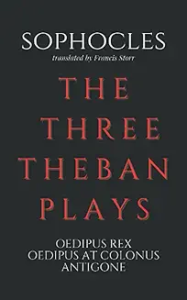Oedipus the King by Sophocles 430 BCE
I had read this classic Greek play written during the golden age of Athens in the 5th C BCE and cited by Aristotle as the ‘most brilliant example of theatrical plot’, when in college, but decided to read it again when a friend obtained two tickets for a new London staging that was long sold-out. In addition, the playwright for this new production, Ella Hickson, is coming to the Radcliffe Institute this year. So back to ancient Greece.
It’s probable that nearly 100% of adults can give you some version of the Oedipal story—the man who is fated by the gods to kill his father and marry and have children with his mother—but the play is well-worth reading for its layers of complexity and human emotion. It is a prime example of Greek tragedy, featuring a chorus on stage and the omnipresent gods offstage. The drama builds to a violent ending, setting the stage for the two remaining plays in the Theban trilogy, ‘Antigone’ and ‘Oedipus at Colonus’.
In this, the middle play, we find Thebes in the midst of a terrible plague. Death is everywhere and the people beseech their king, Oedipus, to find a solution. He sends his brother-in-law, Cleon, brother to Oedipus’s wife Jocasta, to consult the oracle at Delphi, and the return message is grim: Thebes must find and execute the person who murdered their previous king, Laius, in order to lift the plague. Oedipus pledges to do so and to mutilate and exile the perpetrator. The play inevitably unfolds to reveal that Oedipus had been born in Thebes to Laius and Jocasta, and when an oracle had prophesied that he would kill his father and marry his mother, baby Oedipus had been abandoned on a mountainside to die. There, however, a shepherd found him and brought him to the king and queen of Corinth where he grew up a brilliant prince ignorant of his origin except for the prophecy. Dogged by this knowledge, he fled Corinth to avoid killing his “father”, only to end up doing ignorant of who his victim was.
The play is brilliantly paced and by its end, Laius is dead, Jocasta has hung herself, and Oedipus has blinded himself with Jocasta’s pins. Cleon is the new king of Thebes and the plague will be lifted.
The play is all about free will and fate, and the role of the gods in Greek life. Do Zeus, Apollo, and the rest of them determine our actions and our lives or is man free to choose? Sophocles appears to want it both ways. The prophecy regarding Oedipus happens despite his enormous efforts to avoid it. On the other hand, despite warnings from Jocasta, the shepherd messenger from Corinth, Tiresias, a blind prophet, and the chorus, Oedipus exercises his free will to relentlessly search for the murderer instead of letting it be. Both free will and prophecy-determined fate are present and it is not clear which one Sophocles wants to be dominant.
This is a classic in more ways than one and worth reading. I’m eager to see tonight’s performance.



